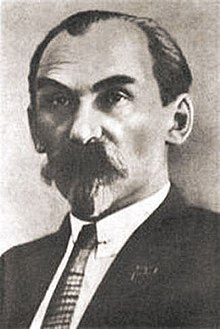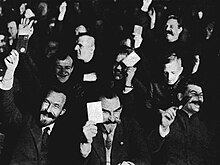Mykola Skrypnyk
Mykola Skrypnyk Микола Олексійович Скрипник | |
|---|---|
 | |
| Chairman of the People's Secretariat | |
In office 4 March 1918 – 18 April 1918 | |
| President | Yukhym Medvedev Volodymyr Zatonsky (chairman of Central Executive Committee) |
| Preceded by | Yevgenia Bosch (acting) |
| Succeeded by | reorganized as The Uprising Nine |
People's Secretary of Labor Affairs | |
In office 4 March 1918 – 18 April 1918 | |
| Prime Minister | Mykola Skrypnyk |
| Preceded by | position created |
| Succeeded by | position disbanded |
People's Commissar of Internal Affairs | |
In office July 1921 – April 1922 | |
| Prime Minister | Christian Rakovsky |
People's Commissar of Justice | |
In office April 1922 – 1927 | |
| Prime Minister | Christian Rakovsky |
| Preceded by | Mikhail Vyetoshkin |
| Succeeded by | Vasyl Poraiko |
| Prosecutor General of Ukraine | |
In office 1922–1927 | |
| President | Grigory Petrovsky |
| Preceded by | position created |
| Succeeded by | Vasyl Poraiko |
People's Commissar of Education | |
In office March 1927 – February 1933 | |
| Prime Minister | Vlas Chubar |
| Head of Derzhplan UkrSSR | |
In office February 1933 – 7 July 1933 | |
| Prime Minister | Vlas Chubar |
| Preceded by | Yakym Dudnyk |
| Succeeded by | Yuriy Kotsiubynsky |
| Personal details | |
| Born | (1872-01-25)25 January 1872 Yasynuvata, Yekaterinoslav Governorate, Russian Empire |
| Died | 7 July 1933(1933-07-07) (aged 61) Kharkiv, Soviet Union |
| Citizenship | Russia, Soviet |
| Nationality | Ukrainian |
| Political party | RSDLP(b) |
| Alma mater | Saint Petersburg State Institute of Technology |
Mykola Oleksiyovych Skrypnyk (Ukrainian: Микола Олексійович Скрипник, also known as Nikolai Alekseevich Skrypnik, 25 January [O.S. 13 January], 1872 – 7 July 1933) was a Ukrainian Bolshevik leader who was a proponent of the Ukrainian Republic's independence, and led the cultural Ukrainization effort in Soviet Ukraine. When the policy was reversed and he was removed from his position, he committed suicide rather than be forced to recant his policies in a show trial. He also was the Head of the Ukrainian People's Commissariat, the post of the today's Prime-Minister.
Contents
1 Ukrainian independentist
2 Ukrainization
3 Purged
4 See also
5 Footnotes
6 Further reading
Ukrainian independentist
Skrypnyk was born in the village Yasynuvata of Bakhmut uyezd, Yekaterinoslav Governorate, Russian Empire in family of a railway serviceman. At first he studied at the Barvinkove elementary school, then realschules of the cities Izium and Kursk. While studying at Saint Petersburg State Institute of Technology, he was arrested on political charges in 1901, prompting him to become a full-time revolutionary. Originally member of the Saint Petersburg Hromada society, Skrypnyk left it and joined the Russian Social Democratic Labour Party. Skrypnyk was eventually excluded from the Institute. He was arrested fifteen times, exiled seven times, and at one point he was sentenced to death. In 1913 Skrypnyk was an editor of the Bolshevik's legal magazine Issues of Insurance and in 1914 was a member of the editorial collegiate of the Pravda newspaper.
After the February Revolution Skrypnyk arrived from one of his exiles to Morshansk (Tambov Governorate) to Petrograd where he was elected as a secretary of the Central Council of Factories Committees. During the October Revolution Skrypnyk was a member of the MilRevKom of the Petrograd Soviet of Workers' and Soldiers' Deputies.
In December 1917, Skrypnyk was elected in absentia to the first Bolshevik government of Ukraine in Kharkiv (Respublika Rad Ukrayiny), and in March 1918 Soviet leader Vladimir Lenin appointed him its head. He replaced at that assignment Yevgenia Bogdan (Gotlieb) Bosch, daughter of a German immigrant. Skrypnyk was a leader in the so-called Kiev faction of the Ukrainian Bolsheviks, the independentists, sensitive to the issue of nationality, and promoting a separate Ukrainian Bolshevik party, while members of the predominantly Russian Katerynoslav faction preferred joining the All-Russian Communist Party in Moscow, according to Lenin's internationalist doctrine. The Kiev faction won a compromise at a conference in Taganrog, Soviet Russia in April 1918, when the Bolshevik government was dissolved and the delegates voted to form an independent Communist Party (Bolshevik) of Ukraine, CP(b)U. But in July, a Moscow congress of Ukrainian Bolsheviks rescinded the resolution, and the Ukrainian party was declared a part of the Russian Communist Party.

Front row: Rykov, Skrypnyk and Stalin voting at the 15th Congress of the All-Union Communist Party (Bolsheviks)
Skrypnyk worked for the Cheka secret police during the winter of 1918–19, then returned to Ukraine as People's Commissar of Worker-Peasant Inspection (1920–21), and Internal Affairs (1921–22).
During debates leading up to the formation of the Soviet Union in late 1922, Skrypnyk was a proponent of independent national republics, and denounced the proposal of the new General Secretary, Joseph Stalin, to absorb them into a single Russian SFSR state as thinly-disguised Russian chauvinism. Lenin temporarily swayed the decision in favour of the republics, but after his death, the Soviet Union's constitution was finalized in January 1924 with very little political autonomy for the republics. Having lost this battle, Skrypnyk and other autonomists would turn their attention towards culture.
Skrypnyk was Commissar of Justice between 1922 and 1927.
Ukrainization
Skrypnyk was appointed head of the Ukrainian Commissariat of Education in 1927.
He convinced the Central Committee of the CP(b)U, to introduce the policy of Ukrainization, encouraging Ukrainian culture and literature. He worked for this cause with almost obsessive zeal, and despite a lack of teachers and textbooks and in the face of bureaucratic resistance, achieved tremendous results during 1927–29. Ukrainian language was institutionalized in the schools and society, and literacy rates reached a very high level. As Soviet industrialization and collectivization drove the population from the countryside to urban centres, Ukrainian started to change from a peasants' tongue and the romantic obsession of a small intelligentsia, into a primary language of a modernizing society.
Skrypnyk convened an international Orthographic Conference in Kharkiv in 1927, hosting delegates from Soviet and western Ukraine (former territories of Austro-Hungarian Galicia, then part of the Second Polish Republic). The conference settled on a compromise between Soviet and Galician orthographies, and published the first standardized Ukrainian alphabet accepted in all of Ukraine. The Kharkiv orthography, or Skrypnykivka, was officially adopted in 1928.
Although he was a supporter of an autonomous Ukrainian republic and the driving force behind Ukrainization, Skrypnyk's motivation was what he saw as the best way to achieve communism in Ukraine, and he remained politically opposed to Ukrainian nationalism. He gave public testimony against "nationalist deviations" such as writer Mykola Khvylovy's literary independence movement, political anticentralism represented by former Borotbist Oleksandr Shumsky, and Mykhailo Volobuev's criticism of Soviet economic policies which made Ukraine dependent on Russia.
From February to July 1933 Skrypnyk headed the Ukrainian State Planning Commission, became a member of the Politburo of the CP(b)U and served on the Executive Committee organizing the Communist International, as well as leading the CP(b)U's delegation to the Comintern.
Purged
In January 1933, Stalin sent Pavel Postyshev to Ukraine, with free rein to centralize the power of Moscow. Postyshev, with the help of thousands of officials brought from Russia, oversaw the violent reversal of Ukrainization, enforced collectivization of agriculture, and conducted a purge of the CP(b)U, anticipating the wider Soviet Great Purge which was to follow in 1937.
Skrypnyk was removed as head of Education. In June, he and his "nefarious" policies were publicly discredited, and his followers condemned as "wrecking, counterrevolutionary nationalist elements". Rather than recant, on 7 July he shot himself at his desk at his apartment in Derzhprom at Dzerzhynsky Square (Dzerzhynsky Municipal Raion of Kharkiv city).
During the remainder of the 1930s, Skrypnyk's "forced Ukrainization" was reversed.
He was rehabilitated in 1962.
See also
People's Secretariat, the first government of the Soviet Ukraine
Footnotes
Further reading
Chernetsky, Vitaly (2002). The NKVD File of Mykhaylo Drai-Khmara (PDF). Kyiv: Naukova Dumka. pp. 74–75..mw-parser-output cite.citation{font-style:inherit}.mw-parser-output q{quotes:"""""""'""'"}.mw-parser-output code.cs1-code{color:inherit;background:inherit;border:inherit;padding:inherit}.mw-parser-output .cs1-lock-free a{background:url("//upload.wikimedia.org/wikipedia/commons/thumb/6/65/Lock-green.svg/9px-Lock-green.svg.png")no-repeat;background-position:right .1em center}.mw-parser-output .cs1-lock-limited a,.mw-parser-output .cs1-lock-registration a{background:url("//upload.wikimedia.org/wikipedia/commons/thumb/d/d6/Lock-gray-alt-2.svg/9px-Lock-gray-alt-2.svg.png")no-repeat;background-position:right .1em center}.mw-parser-output .cs1-lock-subscription a{background:url("//upload.wikimedia.org/wikipedia/commons/thumb/a/aa/Lock-red-alt-2.svg/9px-Lock-red-alt-2.svg.png")no-repeat;background-position:right .1em center}.mw-parser-output .cs1-subscription,.mw-parser-output .cs1-registration{color:#555}.mw-parser-output .cs1-subscription span,.mw-parser-output .cs1-registration span{border-bottom:1px dotted;cursor:help}.mw-parser-output .cs1-hidden-error{display:none;font-size:100%}.mw-parser-output .cs1-visible-error{font-size:100%}.mw-parser-output .cs1-subscription,.mw-parser-output .cs1-registration,.mw-parser-output .cs1-format{font-size:95%}.mw-parser-output .cs1-kern-left,.mw-parser-output .cs1-kern-wl-left{padding-left:0.2em}.mw-parser-output .cs1-kern-right,.mw-parser-output .cs1-kern-wl-right{padding-right:0.2em} Includes a concise biography of Skrypnyk in annotation no. 25.
Corbett, D. M. (1963). "The Rehabilitation of Mykola Skrypnyk". Slavic Review. 22 (2): 304–313. JSTOR 3000677.
Magocsi, Paul Robert (1996). A History of Ukraine. Toronto: University of Toronto Press. ISBN 0-8020-0830-5.
Subtelny, Orest (1988). Ukraine: A History. Toronto: University of Toronto Press. ISBN 0-8020-5808-6.
"Mykola Skrypnyk biography". Ukrainian government portal (in Ukrainian). Archived from the original on 2007-09-27.
"Mykola Skrypnyk biography". Ukrainian encyclopedia (in Ukrainian).
| Political offices | ||
|---|---|---|
| Preceded by introduced | Director of All-Ukrainian Institute of Marxism–Leninism 1922–1930 | Succeeded by Aleksandr Shlikhter |

